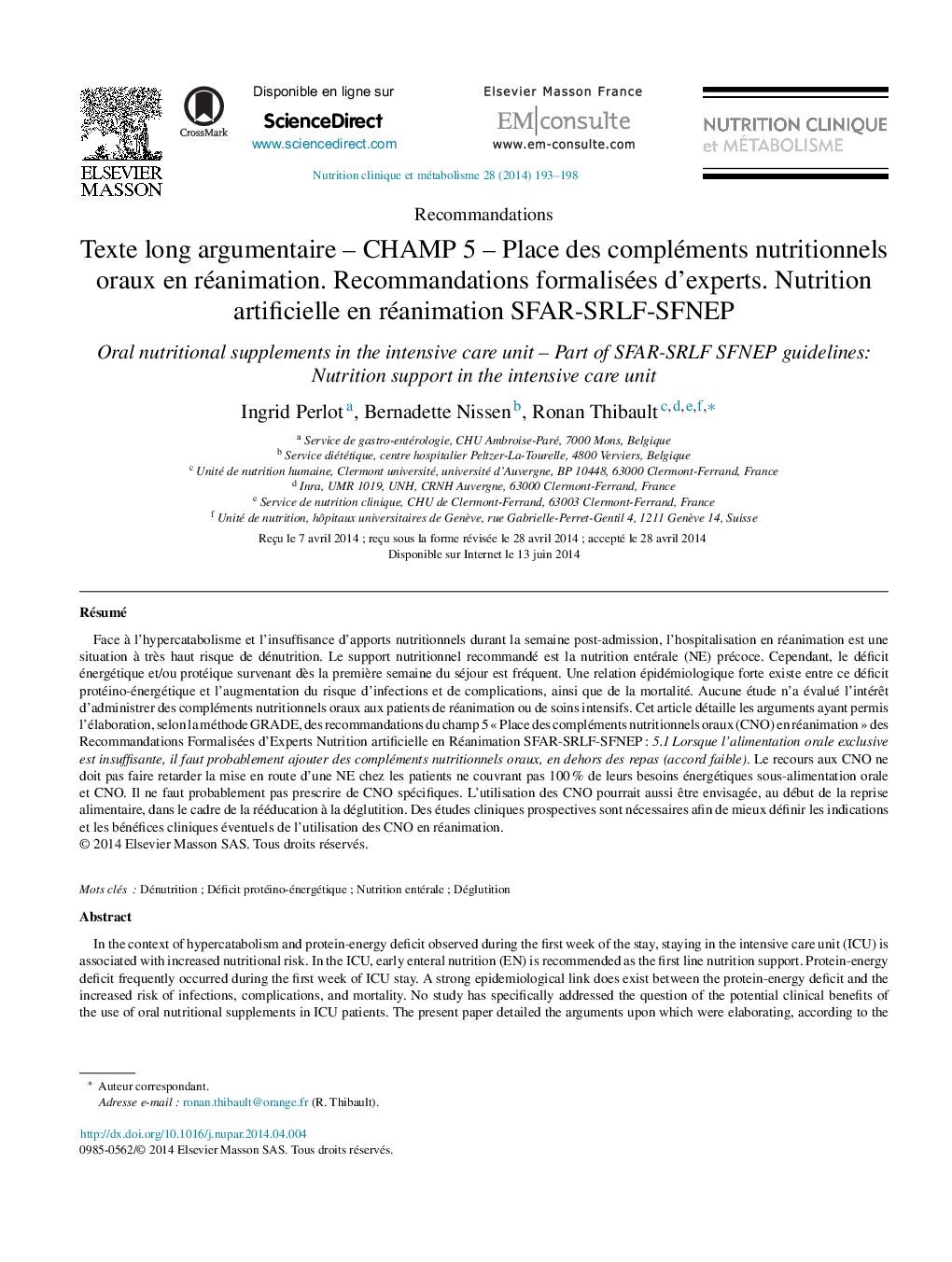| Article ID | Journal | Published Year | Pages | File Type |
|---|---|---|---|---|
| 2692835 | Nutrition Clinique et Métabolisme | 2014 | 6 Pages |
RésuméFace à l’hypercatabolisme et l’insuffisance d’apports nutritionnels durant la semaine post-admission, l’hospitalisation en réanimation est une situation à très haut risque de dénutrition. Le support nutritionnel recommandé est la nutrition entérale (NE) précoce. Cependant, le déficit énergétique et/ou protéique survenant dès la première semaine du séjour est fréquent. Une relation épidémiologique forte existe entre ce déficit protéino-énergétique et l’augmentation du risque d’infections et de complications, ainsi que de la mortalité. Aucune étude n’a évalué l’intérêt d’administrer des compléments nutritionnels oraux aux patients de réanimation ou de soins intensifs. Cet article détaille les arguments ayant permis l’élaboration, selon la méthode GRADE, des recommandations du champ 5 « Place des compléments nutritionnels oraux (CNO) en réanimation » des Recommandations Formalisées d’Experts Nutrition artificielle en Réanimation SFAR-SRLF-SFNEP : 5.1 Lorsque l’alimentation orale exclusive est insuffisante, il faut probablement ajouter des compléments nutritionnels oraux, en dehors des repas (accord faible). Le recours aux CNO ne doit pas faire retarder la mise en route d’une NE chez les patients ne couvrant pas 100 % de leurs besoins énergétiques sous-alimentation orale et CNO. Il ne faut probablement pas prescrire de CNO spécifiques. L’utilisation des CNO pourrait aussi être envisagée, au début de la reprise alimentaire, dans le cadre de la rééducation à la déglutition. Des études cliniques prospectives sont nécessaires afin de mieux définir les indications et les bénéfices cliniques éventuels de l’utilisation des CNO en réanimation.
In the context of hypercatabolism and protein-energy deficit observed during the first week of the stay, staying in the intensive care unit (ICU) is associated with increased nutritional risk. In the ICU, early enteral nutrition (EN) is recommended as the first line nutrition support. Protein-energy deficit frequently occurred during the first week of ICU stay. A strong epidemiological link does exist between the protein-energy deficit and the increased risk of infections, complications, and mortality. No study has specifically addressed the question of the potential clinical benefits of the use of oral nutritional supplements in ICU patients. The present paper detailed the arguments upon which were elaborating, according to the GRADE method, the recommendations regarding the field 5 “Oral nutritional supplements (ONS) in the intensive care unit” of the French Societies SFAR-SRLF-SFNEP guidelines “Nutrition support in the intensive care unit”: 5.1. When oral food is insufficient, ONS should be added, outside of meals time (weak agreement). The use of ONS must not delay the initiation of EN in the patients who did not cover their energy needs under oral food plus ONS. Specific ONS are useless in the ICU. ONS could be used at the beginning of food reintroduction, in the context of swallowing rehabilitation. Prospectives clinical studies are needed to better define the indications and the clinical benefits of ONS in the ICU.
